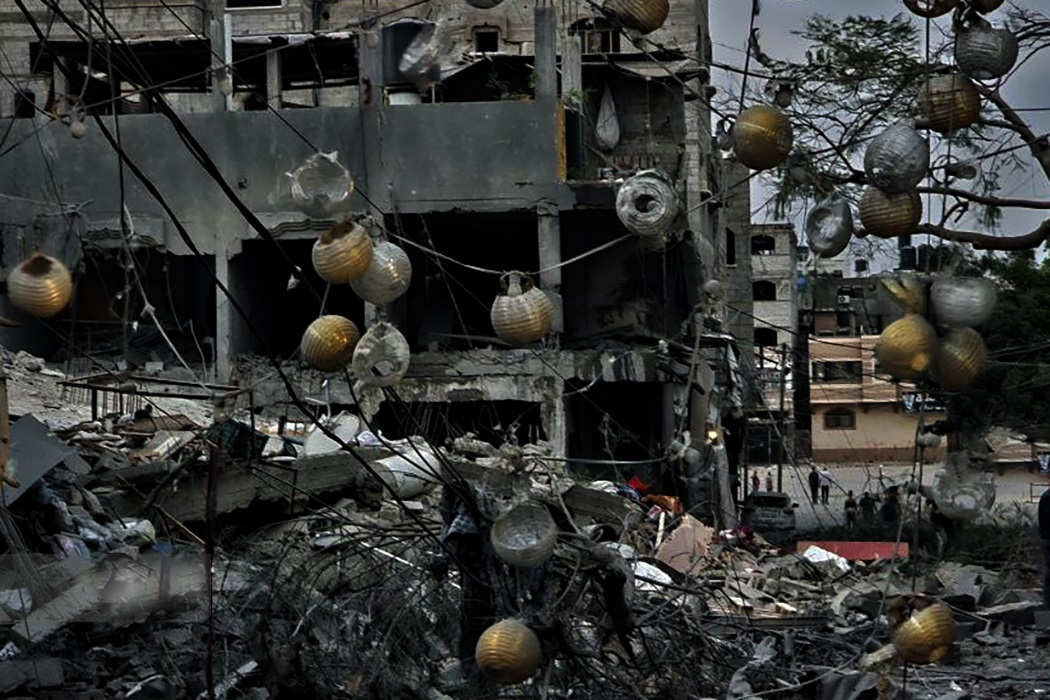In April 2024 the European Centre for Constitutional and Human Rights (ECCHR) filed a lawsuit against the German government for exporting war weapons to Israel and the consequent threat to civilian life. The lawsuit was made in the name of five Palestinians living in the Gaza strip who had lost family members in the Israeli bombardment. The action was supported by Raji Sourani, Director of the Palestinian Centre for Human Rights in Gaza:
“Germany should ultimately urge Israel to stop the aggressions in Gaza. (…) The stop of all weapon deliveries would be an important political signal in that regard. (..) International human rights exist to protect civilians in times of war. Instead we witness dogs eating the corpses of our children in the ruins of Gaza. Germany should not deliver even one of the bullets that kills us in Gaza and demand an immediate ceasefire”
In early June the Berlin administrative court declined the ECCHRs request. It gave reasons similar to the ICJs denial of Nicaragua’s urgent application to prohibit German arms exports to Israel. Namely – currently the German government is not delivering any weapons of war and has not been since the beginning of 2024. This change is apparently in response to Israeli warfare. The German government has therefore in practice, put a stop to war weapon exports. Even though it will not publicly advertise it as such.
Is Germany therefore not as complicit in Israeli war crimes as Nicaragua has argued? Does this change in practice absolve Germany from claims that it is supporting a genocide?
A look at the history of German arms trades with Israel proves otherwise. Since the 1950s Germany has supported Israel militarily, establishing itself as its second biggest arms dealer. In the period from 2019 to 2023 Germany’s share of major conventional arms imported by Israel was 30%, second after the US at 69% In 2023 the German exports of military equipment to Israel spiked significantly. Licences worth 326.5 million euros were granted in 2023, a ten-fold increase from the previous year. Most of these licences were granted after October 2023. Some of these licences included:
3,000 portable anti-tank weapons, mainly the “Matador”
Manufactured by the company Dynamit Nobel Defense, the Matador was first used in the 2009 Israeli operation “Cast Lead” (known as the Gaza massacre). Its use in the current massacre of Gaza has been documented repeatedly. For instance in a video clip of IDF soldiers gleefully firing Matador missiles at homes in Khan Younis.
Two Sa’ar 6 Corvette Warships
One third of the construction costs of these warships, manufactured by ThyssenKrupp Marine Systems, was subsidised by the German state. The Sa’ar 6 Corvettes have been documented striking the Gaza strip from the sea as early as October 16th, 2023.
50 diesel engines for Merkava 4 tanks and Namer APC
Since 2002, Germany has exported around 1060 of diesel engines fitted to the Merkava tanks to Israel. The Merkava 4 tank is considered one of the “main assets” in the Gaza ground invasion. The Israeli use of tanks against Palestinian civilians has repeatedly been criticised. Including when a alleged IDF soldier posted a video from a Merkava 4 tank, claiming he had run over the Palestinian civilian in front of the vehicle shortly after.
Evidence is piling up of German arms being actively used in the killing of Palestinians. Meanwhile the German government claims it does not know if its exports are being used in the Gaza strip as they were theoretically restricted to training purposes. This pretence of ignorance admits a total failure of arms regulations. But it also shows a ‘benign’ neglect of the government in accepting becoming an active and involved party in Israel’s massacres. It is symptomatic of the general mendaciousness of the German rhetoric around arms sales. For example:
The Ministry of Economy and Climate Protection claims that the government has “imposed particularly strict rules on itself in this sensitive area and pursues an extremely restrictive licensing policy. (…) The government pays special attention to the general human rights conditions in the receiving country, as well as that the goods are not misused for human rights violations or the aggravation of crisis.”
However, compared to 4,427 individual arms export licences to Israel approved by the German government since 2003, only 54 were rejected, an approval rate of 99.74%. These rates are standard, and place claims of an “extremely restrictive licensing policy” into serious question. Moreover it is also difficult to fully scrutinise these exports, due to the lack of transparency. Information about licences are only published after they have been decided on. This makes legal procedures against pending licences near impossible. Details about the actual exports are also scarce. The war weapon exports to Israel are redacted after 2018.
Furthermore, the German legal framework for arms exports distinguishes between “weapons of war” and “military equipment”. “Military equipment” has a faster approval procedure. However, “military equipment” can also include components of weapon systems creating a false distinction as such components are treated as “armaments lite”. Dismissing Nicaragua’s and the ECCHR’s legal cases against Germany were on the basis that there are no deliveries of “war weapons” anymore. It is unclear how far the deliveries of “military equipment” continues.
A call for a broader sense of an arms embargo, which includes military equipment, is therefore necessary. Such a resolution was adopted already in April by the Human Rights Council. That backed a call “to cease the sale, transfer and diversion of arms, munitions and other military equipment to Israel, the occupying Power… to prevent further violations of international humanitarian law and violations and abuses of human rights”.
The German delegation, however, was one of six which voted against the resolution, noting that it “refrains from mentioning Hamas and denies Israel the exercise of its right to self-defence”. This line is by now well-known to those following German political discussion on the war in Gaza. It is an incessantly repeated mantra which skirts around any actual confrontations with Israeli war crimes.
Sevim Dagdelen of the Bündnis Sahra Wagenknecht (BSW) subsequently introduced their proposal for an arms embargo to Israel with the requested condemnation of the Hamas terror attack on October the 7th in front of the German Bundestag. But Alexander Müller of the FDP was quick to dismiss this proposal, this time for not including a call for the release of hostages as well. Müller did not spend a single word on the atrocities committed by the IDF mentioned by his colleague from the BSW.
This game of moving goal posts again highlights the unwillingness of the German government to actually confront accusations of the brutal killings committed with the weapons they approved a few months earlier. It is symptomatic of the spinelessness of this current government. That does not dare to advertise their drastic reduction of war weapon deliveries nor enact an official embargo out of fears of criticism.
At the same time the extent of their “military equipment” exports are opaque to scrutiny. This nauseating charade is played out in front of the horrifying backdrop of Thyssen-Krupp and Dynamite Nobel Defense tools aiding the massacre of currently more than 37,000 Palestinians.
We need a general shift in German war export policies. That must include transparency, true restriction and placing the axiom of human rights over the economic interest of German arms manufacturers. Moreover it needs an official arms embargo including all tools of war. That would be a clear signal that Germany investigates the deployment of its exported arms and does not condone its exports being used in a genocide. Germany has already made itself complicit in Israel’s war crimes. However the continuation of its involvement lies in the hands of the German government.




